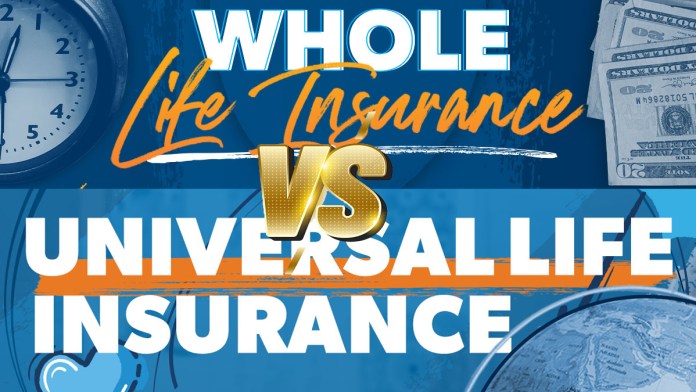Life insurance can help protect your loved ones from financial issues when you pass away. If you want to purchase permanent life insurance, you may be trying to choose between two common options: whole life vs. universal life insurance. Although these policy types share various similarities, there are significant differences.

Understanding each can help you meet your loved ones financial goals. In this article, we will help you understand the differences between whole life and universal life insurance. So that you can make a good decision about which one is the perfect option for you.
Whole Life Insurance
Whole life insurance is a type of permanent life policy that has fixed death benefits and premiums. The cash value within this policy is accumulated at a fixed interest rate, such as 2 percent, which gives it more predictability than that of the universal life.
Pros
- Offers lower risk
- Fixed-deal benefit, premium, and rate for cash value growth
- It is the easiest type of permanent policy because everything is fixed and simple to understand.
Cons
- It does not offer flexibility to change the death benefit or premium amount as needs change.
- Premiums can be very costly compared to other types of life insurance.
- It builds less cash value compared to some universal life policies.
Who is Whole Life Insurance for?
Choosing this type of policy is like planting a sturdy tree for the future of your family and loved ones. It’s a good choice for people who want guarantees and steady cash growth. If you’re thinking about final expenses like funeral costs, whole life is a perfect option.
It’s also a good one if you have someone who depends on you financially. You can set up a special trust to manage the money and ensure they’re taken care of even after you die. You get to choose who looks after the trust, and there’s always a backup plan active.
Universal Life Insurance
Universal life insurance allows you to adjust both the death benefit and premiums to fit your needs within certain limits. It also increases cash value. The rate grows depending on the type of universal life insurance you go for: guaranteed, indexed, or variable universal life insurance.
Pros
- It offers more flexibility by enabling you to adjust your death benefit and premiums.
- Various types of this insurance allow you to choose a policy that meets your life insurance choices.
- A variable or indexed universal life insurance policy may gain more cash value than the whole life policy.
Cons
- Selecting subaccounts in variable universal policy requires knowledge about active policy management and those investments.
- A variable universal policy is success, which is linked to subaccount decisions. This may not interest individuals who do not want to engage actively in investment decisions.
- An indexed universal policy participation cap and rate can limit the cash value growth potential even if the markets do really well.
Who is Universal Life for?
Universal life insurance is very similar to a custom-fit jacket for your financial needs. It’s a good choice for people who want a lifelong plan that bends and stretches with them. You can adjust your coverage and payments depending on your financial situation. Also, if you’re into picking your personal investments, this policy lets you take the reins.
Main Differences between Whole Life and Universal Life
The main differences between whole life and universal life insurance are the premium and cash value growth. They both help to protect your loved ones from financial issues but their factors are totally different. One has a fixed death benefits and premium and the other allows you to adjust to fit your needs.
| Policy attributes | Whole life | Universal Life |
| Premiums | Fixed | Flexible within limits |
| Cash value | The Guaranteed cash value growth is based on a fixed interest rate | The cash value growth is different by type of the policy |
| Death benefits | Fixed | Flexible within limits |
| Premiums | High premiums | Low premiums like guaranteed universal life |
Whole Life vs. Universal Life Insurance: Which is more expensive?
Whole life is more expensive than universal life. According to the general rule, you will be twice as much for whole life compared to universal life. And the reason is that the death benefit, premium payment amount, and cash value growth are guaranteed and will not change. On the other hand, you can adjust the universal premium amounts and death benefit. You may have to undergo underwriting again to get a very high death benefit.
Whole Life vs. Universal Life Insurance: Which Is Right for You?
When it comes to these insurance types, it comes down to your desired flexibility or stability. People who love guarantees and stability may be attracted to a whole life insurance policy. Meanwhile, people who prefer flexibility may choose universal life insurance as a better choice.
It is advisable to sit down with your financial advisor to talk about your personal financial plan. After that, you can see what type of life insurance matches your goals. It may later turn out that a term life insurance policy is just what you need.



